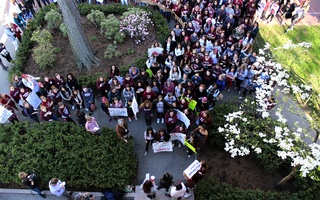{shortcode-21f0214d5ce82fa9d8e38ae95d76eead78114f66}
Traditionally all-female final clubs and sororities will be allowed to retain their “gender focus” for the next few years—and potentially beyond that period—while complying with the College’s policy penalizing single-gender social groups, according to Associate Dean of Student Life David R. Friedrich.
In an interview Tuesday, Friedrich clarified the details of a three to five year “bridge” program for all-female social organizations proposed by a committee tasked with implementing the College’s penalties against single-gender social groups.
In a report released on March 6, the committee wrote that it “supports the idea of continuing to allow the female final clubs and sororities to operate with gender focused missions, with the understanding that the positive contributions of those organizations to the campus community would be assessed in three to five years.”
Having accepted nearly all of the committee’s recommendations, including the proposed bridge program, Dean of the College Rakesh Khurana wrote in a College-wide email that he agreed that historical inequalities faced by women at the College may require additional resources to aid all-female groups in transitioning into “inclusive organizations.”
“I will consult with the Dean of Students and the Committee on Student Life on how to best support a vigorous and non-discriminatory social experience responsive to the realities that our students… are not all starting from the same place,” Khurana wrote in an email.
Days after the historic policy—which may make undergraduates in single-gender social groups ineligible for some scholarships, fellowships, and leadership positions—was unveiled in May 2016, hundreds of Harvard women took to Harvard Yard to protest it. Demonstrators criticized the College for what they described as an unfair targeting of spaces for women.
On Tuesday, Friedrich said that the Office of Student Life is “available” and has its “doors open” to social groups that want to access to resources given to recognized student groups—including access to on-campus space, funding for social events, and the ability to co-sponsor events—and be a “part of the social experience on campus in a more visible way.”
“What we’re doing right now, and what we want to be able to do, is to talk directly with individual groups,” he said. “I think what we found in this process is that each organization is in their own space on where they are in their thinking about gender inclusion.”
Friedrich clarified, however, that any groups’ gender-focused mission should exist simultaneously with “substantive advancement toward full inclusion,” including gender inclusivity. Since their unveiling in May, College administrators have touted the social group penalties as potential solutions to gender discrimination at Harvard.
Lulu S. Chua-Rubenfeld ’18, the president of the formerly all-female Sab Club, wrote in a statement that the Sab is “definitely willing to work with the OSL,” and “eager to see what kind of provisional benefits [the OSL] has in mind.”
She added, “I think that the benefits and the bridge period—while the latter doesn’t apply to us—are good steps in acknowledging the different circumstances traditionally female organizations have undergone and the obstacles they’ve faced on a variety of levels.”
After the bridge period is over, Friedrich added that the continued ability for social groups to retain a gender-focused mission that is in line with the College’s policy will be subject to further review.
“I think that’s precisely what the Committee on Student Life is going to have to look at,” he said.
—Staff writer Derek G. Xiao can be reached at derek.xiao@thecrimson.com. Follow him on Twitter @derekgxiao.
Read more in News
Former Defense Secretary Discusses Military InnovationRecommended Articles
-
 Sab To Go Gender Neutral Next Fall, Host Open Punch
Sab To Go Gender Neutral Next Fall, Host Open Punch -
 During Sanctions Review, OSL Administrators Meeting With Social Group Leaders
During Sanctions Review, OSL Administrators Meeting With Social Group Leaders -
 UC Leaders Criticize Proposal to Ban Social Groups
UC Leaders Criticize Proposal to Ban Social Groups -
 College Cancels ‘Bridge’ Program For All-Female Social Groups
College Cancels ‘Bridge’ Program For All-Female Social Groups -
Better Than A BridgeThere are many ways the University can support women on this campus; the bridge program simply was not one of the most effective ways it could have done so.













